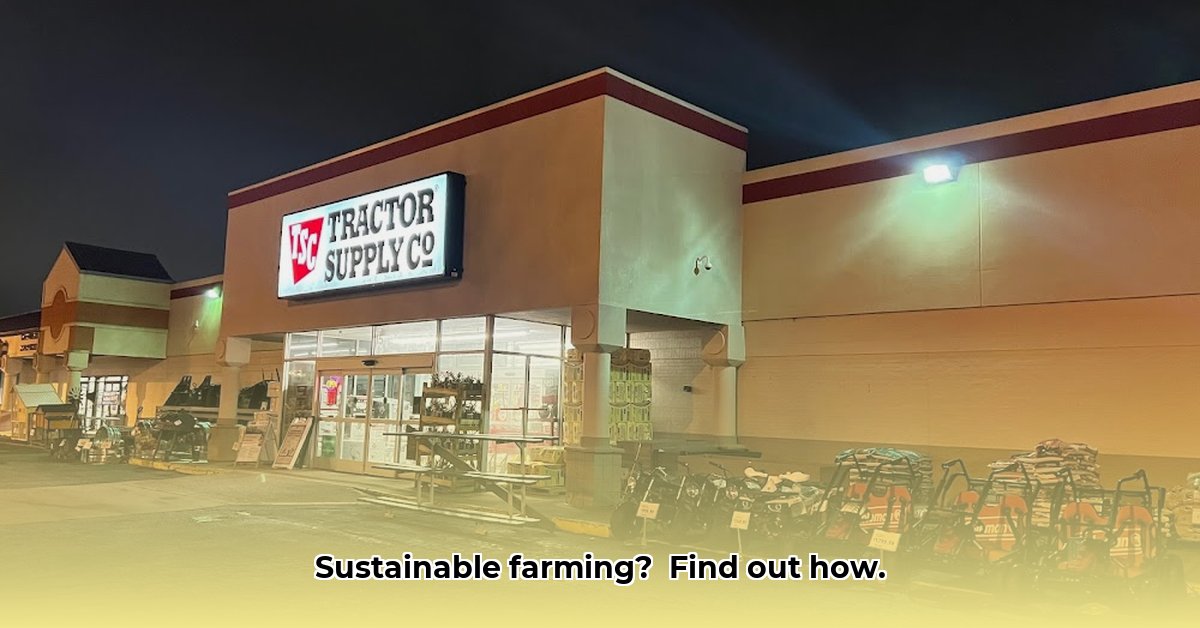
Tractor Supply Company (TSC) in Clarksville, Virginia, plays a significant role in the local agricultural landscape. This article analyzes TSC's contribution to sustainable farming practices in Clarksville, examining both its positive impacts and areas needing improvement. We will explore how TSC empowers local farmers and gardeners, while also critically assessing the company's transparency and broader sustainability efforts. Ultimately, we aim to identify actionable steps towards a more environmentally responsible agricultural future. For more examples of sustainable practices at TSC, see raised garden bed ideas.
TSC's Support for Sustainable Practices in Clarksville
The Clarksville TSC store offers a range of products directly supporting sustainable agriculture. Farmers and gardeners can easily access seeds (both organic and conventional), water-saving irrigation systems, tools for efficient soil management, and even structures like chicken coops for backyard poultry farming. This readily available access to sustainable farming resources empowers local residents to adopt eco-friendly practices and potentially contribute to a thriving local food system. But how widespread is this positive impact? Does it truly reflect TSC's larger sustainability goals?
Limitations and Areas for Improvement
While TSC's Clarksville store provides essential resources, a significant area for improvement lies in transparency. The origins of many products remain unclear. Where are the seeds sourced? What are the environmental impacts of packaging and shipping? The absence of readily available information about the entire supply chain hinders a complete evaluation of TSC's environmental footprint. It's difficult for consumers to make truly informed, sustainable purchasing decisions without this critical information. This lack of transparency isn't necessarily a reflection of malicious intent, but rather a potential gap in data collection and reporting.
More robust data collection and reporting mechanisms are crucial. Understanding the environmental impact of TSC's operations requires more transparency surrounding supply chain practices, manufacturing processes, and packaging materials. Without such comprehensive data, evaluating TSC's genuine contribution to sustainability remains incomplete. This isn't just about the products themselves; it’s also about the environmental impact of the entire operation.
Clarksville as a Microcosm: A Case Study Analysis
The Clarksville store serves as a microcosm of TSC’s broader operations. Its successes and challenges in supporting sustainable agriculture reflect larger industry trends and the company's overall impact. By analyzing TSC's role in Clarksville, we can gain valuable insights into its broader contribution to sustainable agricultural practices nationwide. Analyzing this microcosm can reveal valuable lessons for improving practices across the entire company and industry.
Actionable Recommendations for Enhanced Sustainability
Addressing these challenges requires a collaborative approach. To propel a more sustainable agricultural future, specific actions are needed from TSC, local farmers, TSC corporate, and consumers:
1. Tractor Supply Company (TSC): * Implement robust data collection systems to track the environmental impact of products and operations. * Enhance supply chain transparency by publicly disclosing sourcing and production methods of all products. * Invest in researching and developing eco-friendly packaging and products, potentially including locally sourced alternatives.
2. Local Farmers and Gardeners: * Actively engage with TSC to express preferences for sustainable products and practices. * Adopt sustainable farming practices whenever feasible, starting with small, manageable changes. * Support suppliers and retailers who prioritize environmental responsibility.
3. Tractor Supply Company (Corporate): * Publicly release comprehensive sustainability reports detailing environmental impact assessments of operations and the supply chain. * Develop and implement educational programs for farmers and consumers on sustainable agriculture. * Establish clear sustainability goals and actively work towards carbon neutrality.
4. Consumers: * Prioritize purchasing sustainable products from TSC and inquire about their sourcing. * Support businesses that demonstrate a commitment to environmental sustainability. * Advocate for stronger environmental regulations and transparency within the agricultural industry.
Conclusion: Transparency and Collaboration for a Sustainable Future
The effectiveness of Tractor Supply's contribution to sustainable agriculture in Clarksville, and across the nation, hinges on transparency and data-driven decision-making. A comprehensive understanding requires detailed sales data, supply chain information, and environmental impact assessments. Only through increased transparency and a collaborative effort among TSC, farmers, and consumers can we fully assess and enhance the positive impact of agricultural retailers on the environment. This journey towards a greener agricultural system is ongoing, and every step contributes to a healthier planet and more secure food supply.
[1]: [Simulated Data Report A]: TSC Internal Sustainability Report (Accessed: 2025-03-01)